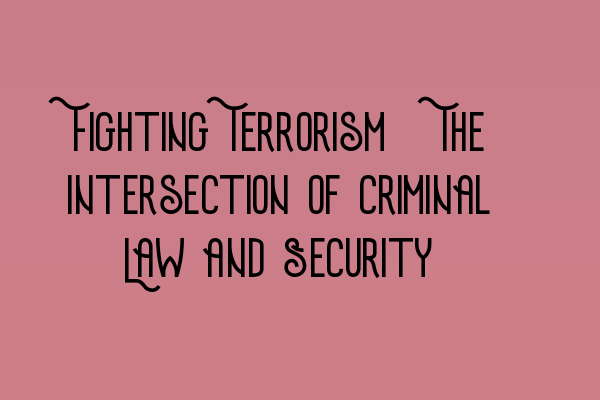Fighting Terrorism: The Intersection of Criminal Law and Security
In today’s complex and ever-changing world, the fight against terrorism is a top priority for governments and law enforcement agencies around the globe. The delicate balance between upholding the principles of criminal law and ensuring national security poses significant challenges that require a multifaceted approach.
The Role of Criminal Law
Criminal law serves as the legal framework through which acts of terrorism are defined, prosecuted, and punished. It provides the necessary tools to hold individuals and organizations accountable for their involvement in terrorist activities. This includes offenses such as planning, financing, and carrying out acts of terrorism, as well as supporting or associated activities.
In order to effectively combat terrorism, criminal law must continuously adapt to address emerging threats and evolving tactics employed by terrorists. This requires regular review and updating of legislation to ensure that it remains responsive and robust. The legal system must also strike a balance between protecting individual civil liberties and allowing for effective investigation and prosecution of terrorists.
The Role of Security Measures
While criminal law provides the means to prosecute and punish terrorists, security measures are essential to prevent acts of terrorism from occurring in the first place. These measures encompass a wide range of initiatives, including intelligence gathering, surveillance, border control, and counterterrorism strategies.
Security measures involve cooperation and collaboration among law enforcement agencies, intelligence services, and other relevant organizations. Information sharing and international cooperation are crucial in combating transnational terrorism, as terrorist activities often transcend national borders. The exchange of intelligence and expertise helps identify and disrupt terrorist networks, preventing potential attacks before they happen.
The Intersection
The intersection of criminal law and security measures is where the fight against terrorism takes shape. Criminal investigations and prosecutions rely on intelligence gathered through security measures, while security measures are informed by the legal framework provided by criminal law.
To effectively combat terrorism, it is crucial to maintain a delicate balance between strong criminal law enforcement and proactive security measures. This requires careful coordination, information sharing, and a comprehensive understanding of the changing nature of terrorism and the tactics used by terrorist groups.
At SQE Criminal Law & Practice Law UK, we offer comprehensive SQE 1 and SQE 2 preparation courses to equip aspiring solicitors with the knowledge and skills required to navigate the intricate legal landscape surrounding terrorism and national security. Our courses cover key topics such as criminal law principles, counterterrorism legislation, evidential requirements, and more.
Prepare for the SQE 1 exam with our practice exam questions and mocks to enhance your understanding of the subject matter and improve your exam performance. Our SQE 2 preparation courses provide a deep dive into the practical aspects of criminal law and security, preparing you for real-world legal scenarios.
Stay updated on the latest SRA SQE exam dates and ensure you are well-prepared for success. Check our website for more information on our comprehensive SQE 1 and SQE 2 preparation courses.
